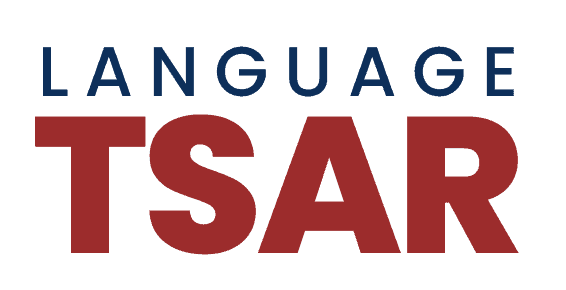If you are looking for the fastest way to learn French, you have come to the right place! This article will help you set high yet realistic goals, maintain motivation, become consistent and avoid procrastination, combine learning methods to achieve greater results, and give you some ideas on how to spice up your learning style.
One of the biggest reasons people give up learning French is great expectations combined with a lack of consistent learning. As you might expect, your motivation to learn a language tends to be the highest at the start.
You may even have a picturesque vision of yourself, sipping red wine, enjoying a view from a Parisian rooftop, and speaking casually with the stranger about art. But, there’s a long way between your dream and reality. Having a romantic picture in your head will surely boost your motivation, but unless there is consistent and methodical learning behind it, you’ll end up like Joey from Friends. And we won’t let you quit so soon.
Is French Hard to Learn?

1. Set achievable and realistic goals
To set a realistic goal there are some questions you should be asking yourself first. Think about the reason you are learning a language.
Is it traveling, reading books, business, connecting with friends? Your answers will help you determine the path you want to take, and how far you want to go. Specific goals are easier to achieve than vague ones. Make sure to know precisely what you want first.
To decide if a goal is realistic, you must know how it could be achieved. Signifying that, you’ll need to break the goal into small steps. Make daily, weekly, and even monthly plans.
Being an independent learner is challenging because sometimes you need to play both roles, one of a student and one of a teacher. Before you hit the books, give yourself assignments and set up an achievable plan.

2. Write your goals down
Neuroscience explains that writing your goals down on paper helps their achievement. That’s why you should be taking the time to write them down attentively. Don’t let your precious piece of paper get covered with a pile of other things. Be aware that the importance you give to making a list could reflect your willingness to achieve it. Use a clear intention of what do you want to achieve, write thoughtfully, and at the end, make your goals visible by putting the list on your desk, bathroom mirror, computer desk as a constant reminder.

3. Discover what kind of language learner are you
Now, that you have set measurable and realistic goals, you’ll need to figure out what kind of learner you are. Each person takes in information differently. That’s why different formats appear all the time, books, newspapers, video, music, pictures. We could divide all the learners into three main categories, Visual, Auditory, and Kinesthetic learners.
If you enjoy doodling on paper or taking notes, this could mean you are soaking in all the information through sight. In that case, choose the material that consists of text, videos with subtitles, notes, projecting maps, and images. Visual learners appreciate colors, so make sure to bring some colorful notes and highlighters. You might also want to get a visual dictionary if you are just starting out.
If you enjoy talking with people or attending live classes, perhaps you are an auditory type. Supply yourself with enough audio material, such as podcasts, songs, Ted talks etc. Podcasts are incredibly convenient because they enable you to learn while you commute or clean the house.
Read our picks for the Best Podcasts in French.
Kinesthetic learners like to engage in an activity to understand the meaning. They might enjoy speaking with French speakers, performing a task, experiencing French through specific assignments. If you are an online shopper, perhaps you could try looking for items in French or read the specifications or reviews. If you like cooking, try out a new recipe and learn all the ingredients in French.
An important thing to remember is that no matter what learning type you are, at a certain point you’ll need to study in all different ways, so your language skills develop evenly. The best value comes when bringing multiple methods together.

4. Get consistent
We all know that studying hastily for an exam, or one single occasion, isn’t enough to be transferred in a long-term memory. Language learning is no different. Revising regularly what you learned, in spaced repetition allows you to activate your knowledge. Each time you revise, you’ll need less time to remember.
Being consistent is one of the greatest challenges, because of many factors trying to pull you back from building a new habit. The art of showing up is the first thing you should be establishing, and at times, it’s more important than the act of learning itself. Plan your learning ahead and be there when the studying time comes. With the internet and all other distractions of the world, we easily find ourselves procrastinating. Remember that the moment you say to yourself, “l could do it later”, you weakened your will for the next time.
To keep your learning consistent, offline and online courses are of great help. Before anything else, they offer a firm structure that leads progressively to improvement. A significant advantage is that it saves time, since all content and exercises are ready to be consumed. In most courses, revisions are included, allowing you to revise in different ways, through writing or listening exercises, role-play etc.
One of the most thorough courses we found is FrenchPod101 by Innovative Language. It offers four levels of expertise from absolute beginner through the advanced speaker. There are audio and video lessons, interactive learning tools, and even one-on-one instruction available. To find more about the course, check our review of French Pod101.
Another great course is Rocket French from Rocket Languages. The course is well-structured and material is comprehensive. We found it to be a good option for people already enrolled in a high school or university French course.

5. Journaling in French
The act of writing itself is utile as a memory-enhancing activity. It allows you to build a closer relationship with the content, and it gives one additional processing layer that your brain goes through. Expressing your emotions and daily thoughts in French, allows your brain to engage, and when your brain engages, it remembers.
Journaling is profoundly personal and could be about anything: your day at work, the book you read, your daily routines, a chat with a friend. Marie Curie’s journals are all about her discoveries in the radioactivity field. Make your journal about something you feel passionate about.
The point is to practice thinking in French, by having regular thoughts. Nothing else. Instead of textbooks or other people’s content, create content out of your ideas. After all, it’s you who will be speaking a language, and talking about your personal ideas and feelings, so you might include French, in your thinking process as soon as possible. It’s about adapting a language to who you are, and not vice versa. At first, you’ll be frustrated as all sentences come in your mother tongue, but once you establish this routine, you’ll see how your passive knowledge is showing up on the surface.
6. Combine methods to learn pronunciation
It is quite normal to lead language battles on several fronts when starting to learn French. It takes time to master the pronunciation and even more time to train your ear. Many learners get disappointed when they realize their inability to get even simple words in French. The same ones they already went through thousands of times.
The French language has many pronunciation specificities, such as nasal vowels, plenty of homophones, peculiar writing systems, unpronounced e’s, and much more. One of the most challenging aspects is called a liaison, or linking sounds, that makes it hard to determine where one word ends and the next one begins. Knowing the word is no guarantee that you’ll be able to understand in oral communication.
When it comes to pronunciation and oral understanding, we suggest combining different learning methods to achieve the best results. Try out understanding the rules, listening to tutorials, practicing in front of the mirror, listening to native speakers, completing listening exercises.
Keep in mind that for certain things in French, no matter how hard you try to learn, will need time. Be gentle on yourself and allow the pronunciation to stick naturally.

7. Name every item around you in French
For the basic vocabulary, this game might be useful: try naming everything at your reach. Whether it’s kitchen, office, street, your wardrobe.
This way you’ll be learning necessary vocabulary while engaging with the given item. If you want to move a game to another level, label every item in the room in French, using sticky notes. It’s less practical, but it is fun and most importantly, useful for remembering difficult vocabulary.
8. Lead a French language lifestyle
This means if it’s raining in Paris, grab an umbrella when leaving the house. Surround yourself with daily things you usually read, do and listen to, all in French. If you are an online buyer, then browse in French. If you are trying out a new cake recipe, why not choosing French “tarte”. Following a French recipe will help you get familiar with the ingredients related vocabulary, and connect with the French culture on many levels. Most importantly, leading a French lifestyle will keep you motivated. You’ll be bouncing off the walls to learn more French.

9. Connect with French community
Find where French people hang out and join them. Perhaps this would have been science fiction thirty years ago, but today with the internet, forums, Facebook groups, and apps, you already have one foot in France. Start by asking a question, replying to someone’s message, or find a language pall. There are plenty of places to do so. Let’s name a Tandem application, a language learning app for finding a partner that will help you practice any language. In exchange, you’ll be helping them learn any of the languages you speak fluently. Everyone wins, and you might end up with a couple of new friends. If you are lucky to have a French institute in your city, don’t miss a chance to connect in the offline world. They often organize events for people to meet, discuss and discover French cultural heritage in a fun and engaging way.

10. Realize that not understanding is okay
Oh, la la ! Je ne comprends pas.
The soonest you apprehend the fact you won’t be able to understand everything, (even as a C1 fluent speaker) the sooner you’ll allow yourself to progress. Having a more relaxed mindset, will allow you to advance more naturally, and keep your motivation flying high. Global understanding is more relevant than going into detail. Particularly at the beginning. Remember that your mother didn’t rush you to say your first words, nor to take your first steps. It all came naturally, out of a loving and supporting place.

Nikolija has been an avid language learner for many years. She became a language teacher, and more recently realized she wants to explore how being a creative learner helps you acquire a new language. Her most recent project was developing a textbook for learning French language (B1) through storytelling and creative projects.


